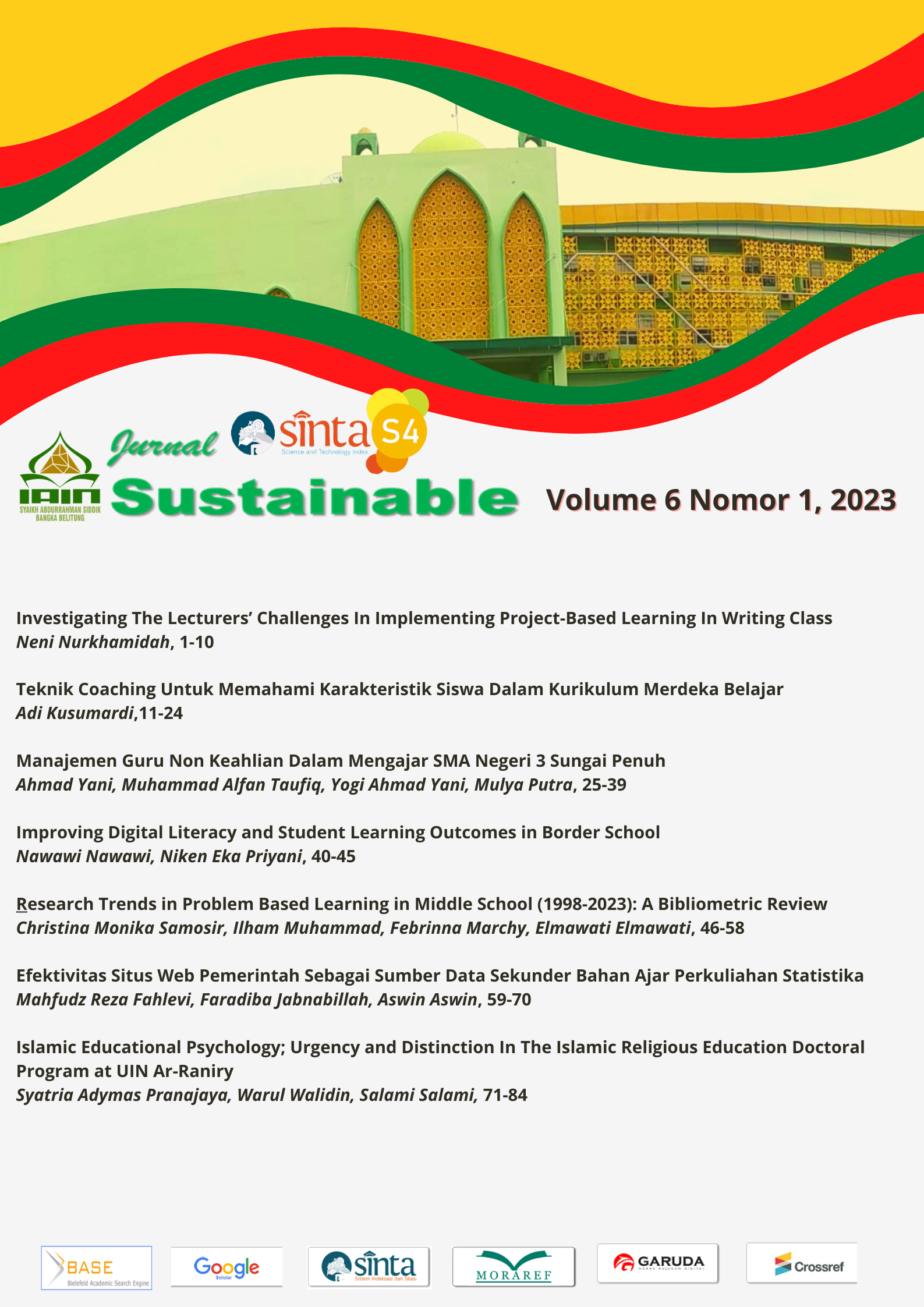Social Institutions in the Qur'an: Ethics and Culture of Student Association Ali Ash-Shabuni's Perspective in the Book of Rawa'iul Bayan
Abstract
This research was motivated by the increasing lack of akhlakul karimah in the character of Indonesian Muslims. They commit acts forbidden in Islam, even to the level of adultery. The purpose of the study was to explain how a person should be ethical and get along correctly from the perspective of Ali Ash-Shabuni. The research method in this article uses qualitative research methods with the type of library research and uses the maudhu'i method, namely by collecting several related verses. The analysis used is descriptive-analysis. Data collection techniques are by collecting data and information such as journals, papers, books, news and other reading sources, especially in the book of Rawa'iul Bayan. The result of the study is that the ethics of association of the opposite sex who are not mahram are divided into six, first do not look at those that can cause slander. Second, do not make physical contact. Third, it is not lonely unless the woman is accompanied by a mahram. Fourth, do not speak which can cause slander. Fifth, for women Islam recommends wearing clothing that covers the entire body except the face and palms. Sixth, Islam forbids women to travel for a day and night without a mahram. In addition, there are three times that are highly recommended to ask permission when entering one's house or room, namely at dawn, the time after Dhuhr and after Isya', because at these times a person is vulnerable in a state of opening the aurat, resting, even being naked.
Downloads
References
Azizah, N. (2018). Pengertian Mahram, Dalil dan Pembagian Mahram.
Badruzaman, A. (2014). Etika Berkomunikasi. 9(1), 177–203.
Basri, A. (2021). Pelajar Radupaksa Pelajar.
Hamdi, S. (2021). Tafsir Surah An-Nur Ayat 58-59: Etika Anak Ketika Ingin Masuk Kamar Orang Tua.
Hernides. (2019). PERGAULAN REMAJA DALAM PERSPEKTIF PENDIDIKAN ISLAM. 1(1), 27–44.
Ilham, D. M., Saepudin, A., Surbiantoro, E., Pendidikan, P., Islam, A., Tarbiyah, F., & Bandung, U. I. (2022). Implikasi Pendidikan dari Al-Quran Surat An-Nur Ayat 30-31 tentang Perintah Menjaga Pandangan terhadap Pendidikan Akhlak. 2(2), 596–605.
Ismatulloh, A. M. (2017). Etika Berkomunikasi Dalam Al-Qur’an Analisis Penafsiran Hasbi Ash-Shiddieqi Dalam Tafsir an-Nur. LENTERA: Jurnal Ilmu Dakwah Dan Komunikasi, 1(2). https://doi.org/10.21093/lentera.v1i2.918
Jalaludin, M., & Azis, A. (2022). Pergaulan Bebas Generasi Muda Dalam Perspefktif Hukum Islam (Al-Qur’an). Al Irsyad: Jurnal Studi Islam, 1(1), 41–56. https://doi.org/10.54150/alirsyad.v1i1.86
Mardiah, R. (2019). Sistem Pergaulan Pria dan Wanita Menurut Perspektif Alquran. 10(2), 238–255.
Moh. Jalaluddin, A. A. (2022). PERGAULAN BEBAS GENERASI MUDA DALAM PERSPEFKTIF HUKUM ISLAM (AL- QUR’AN). 1(1), 41–56.
Mustofa, A. (2023). BEJAT! AYAH DI CIANJUR TEGA PERKOSA ANAK KANDUNG HAMPIR TIAP HARI, INI ALASANNYA.
Nadirah, S. (2017). PERANAN PENDIDIKAN DALAM MENGHINDARI PERGAULAN BEBAS ANAK USIA REMAJA Sitti Nadirah. 9(2), 309–351.
Suna, Ari Susandi, D. H. M. (2022). Etika Berbusana Muslimah Dalam Perspektif Agama Islam Dan Budaya. 4(1), 243–251.
Tohirin, T., & Zamahsari, Z. (2021). Peran Sosial Laki-Laki Dan Perempuan Perspektif Al-Qur’an. Profetika: Jurnal Studi Islam, 22(1), 91–108. https://doi.org/10.23917/profetika.v22i1.14768
Verianty, W. A. (2022). Penyebab Pergaulan Bebas, Dampak dan Cara mencegahnya.
Yunus, M. (2008). Tafsir Qur’an Karim.
Copyright (c) 2023 Rifqatul Husna, Qatrul Ghaits

This work is licensed under a Creative Commons Attribution 4.0 International License.






.png)
